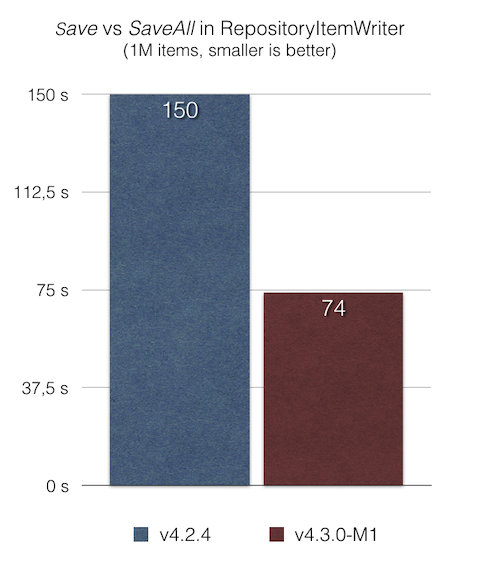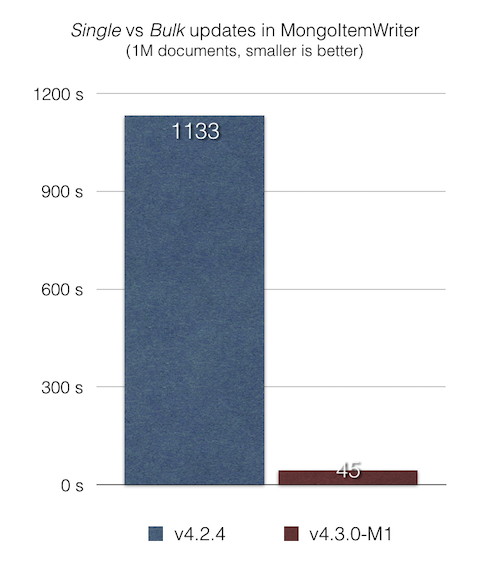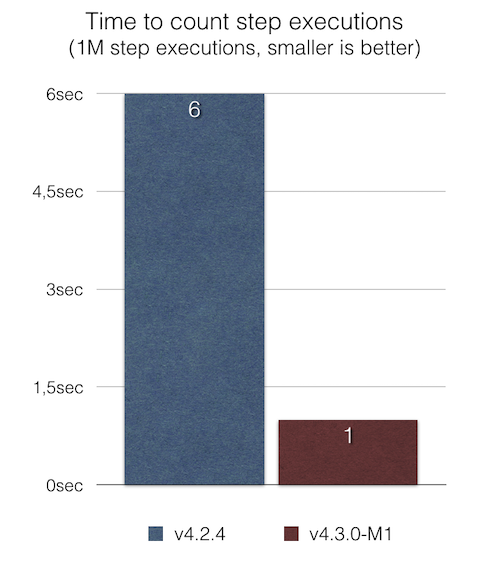Get ahead
VMware offers training and certification to turbo-charge your progress.
Learn moreOn behalf of the Spring Batch team, I am pleased to announce that Spring Batch 4.3.0-M1 is now available from our milestone repository.
This release is packed with new features, performance improvements, and bug fixes, as well as documentation and dependency updates! You can find the complete list of changes in the release notes, but here are the major highlights:
ItemStreamWriterSimilar to the SynchronizedItemStreamReader, we added a SynchronizedItemStreamWriter. This feature is useful in multi-threaded steps where concurrent threads need to be synchronized to not override each other's writes.
JpaPagingItemReaderUp until now, it was possible to use named queries with the JpaPagingItemReader. However, this required the creation of a custom query provider, as follows:
JpaPagingItemReader<Foo> reader = new JpaPagingItemReaderBuilder<Foo>()
.name("fooReader")
.queryProvider(new AbstractJpaQueryProvider() {
@Override
public Query createQuery() {
return getEntityManager().createNamedQuery("allFoos", Foo.class);
}
@Override
public void afterPropertiesSet() throws Exception {
}
})
// set other properties on the reader
.build();
In this release, we introduced a JpaNamedQueryProvider next to the JpaNativeQueryProvider
to ease the configuration, which can now be written like this:
JpaPagingItemReader<Foo> reader = new JpaPagingItemReaderBuilder<Foo>()
.name("fooReader")
.queryProvider(new JpaNamedQueryProvider("allFoos", Foo.class))
// set other properties on the reader
.build();
Similar to how many Spring Boot test annotations are meta-annotated with @ExtendWith(SpringExtension.class) (like @SpringBootTest, @WebMvcTest, and others), we updated @SpringBatchTest to be meta-annotated with @ExtendWith(SpringExtension.class). This simplifies the configuration when writing tests with JUnit Jupiter.
Please note that this feature does not affect JUnit 4 users, it only concerns JUnit 5 based tests.
Along the same lines of performance improvements we introduced in version 4.2, we continued our work on improving several parts of the framework in this release as well.
RepositoryItemWriterUp to version 4.2, it was required to specify the method name to use to save an item to the database. This method was then called in a for loop to save all items. In order to use CrudRepository#saveAll, it was required to extend RepositoryItemWriter and override write(List), which is not convenient.
In this release, we made the RepositoryItemWriter use CrudRepository#saveAll by default. This changes improves the performance of the writer by a factor of 2, according to our benchmark repository-item-writer-benchmark:

MongoItemWriterUp until now, the MongoItemWriter used MongoOperations#save() in a for loop to save items to the database. In this release, we replaced this mechanism with a single call to BulkOperations. With this change, the MongotItemWriter is 25x faster than the previous version, according to our benchmark mongo-item-writer-benchmark:

When starting a new job (or restarting a failed job), Spring Batch does a number of checks to validate a few conditions:
All of these checks involve a call to JobRepository.getStepExecutionCount to count the number of step executions. Up to v4.2, the implementation of this method was loading all job executions and step executions to do the count in-memory on the framework side. In this release, we have changed the implementation to do a single call to the database with a count query. This change improves memory usage as well as the method's response time (by a factor of 6 according to our benchmark step-execution-count-benchmark), which, in turn, improves the overall start time of steps and jobs:

This release upgrades Spring projects dependencies to the following versions:
Spring Batch v4.3.0-M1 can be consumed with Spring Boot 2.4.0-M1, which is planned to be released next week. Stay tuned!
I would like to thank all contributors, especially Parikshit Dutta for his numerous contributions to this release! We look forward to your feedback on this milestone on Twitter, StackOverflow or Github.
All benchmarks have been performed on a Macbook Pro with 16Go RAM, 2.9 GHz Intel Core i7 CPU, MacOS Catalina 10.15.5, and Oracle JDK 1.8.0_201. You can find the source code of all benchmarks in the following links:
Spring Batch Home | Source on GitHub | Reference Documentation